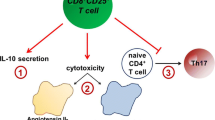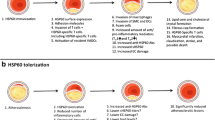Abstract
Clinical evidence suggests anti-Hsp60 antibodies could contribute to atherosclerosis (AS) development, with unclear mechanisms. This study aims to explore the role of anti-HSP60-mediated autoimmunity in AS progression. HSP60-MHC tetramers were used to characterize HSP60-specific CD4 + T cells and assess TCR responses in mice. These cells were transplanted into AS mice to examine immune cell differentiation and infiltration in plaques and blood. Mice were injected with recombinant HSP60 or anti-HSP60 sera to evaluate effects on plaque progression and macrophage activity. Experiments with muMT–/–Apoe–/– mice examined humoral immunity's role in this autoimmunity. HSP60-reactive CD4 + T cells in AS mice differentiated into follicular helper cells, not Th1/Th17. Anti-HSP60 treatments increased macrophage infiltration and M1 polarization, indicating an anti-HSP60-driven inflammatory progression, dependent on humoral immunity. Anti-HSP60 influences macrophage infiltration, polarization, and plaque formation via humoral immunity, shedding light on its potential role in AS progression.
Graphical Abstract






Similar content being viewed by others
Data Availability
The data used to support the findings of this study are available from the corresponding author upon request.
References
Fan J, Watanabe T. Atherosclerosis: Known and unknown. Pathol Int. 2022;72(3):151–60.
Zhu Y, **an X, Wang Z, Bi Y, Chen Q, Han X, Tang D, Chen R. Research Progress on the Relationship between Atherosclerosis and Inflammation. Biomolecules. 2018;8(3):80.
Hansson GK, Hermansson A. The immune system in atherosclerosis. Nat Immunol. 2011;12(3):204–12.
Libby P. The changing landscape of atherosclerosis. Nature. 2021;592(7855):524–33.
Roh JS, Sohn DH. Damage-Associated Molecular Patterns in Inflammatory Diseases. Immune Netw. 2018;18(4):e27.
Mandal K, Jahangiri M, Xu Q. Autoimmune mechanisms of atherosclerosis. Handb Exp Pharmacol. 2005;170:723–43.
Xu Q. Role of heat shock proteins in atherosclerosis. Arterioscler Thromb Vasc Biol. 2002;22(10):1547–59.
Xu Q, Metzler B, Jahangiri M, Mandal K. Molecular chaperones and heat shock proteins in atherosclerosis. Am J Physiol Heart Circ Physiol. 2012;302(3):H506–14.
Boteanu RM, Suica VI, Uyy E, Ivan L, Dima SO, Popescu I, Simionescu M, Antohe F. Alarmins in chronic noncommunicable diseases: Atherosclerosis, diabetes and cancer. J Proteomics. 2017;153:21–9.
Caruso Bavisotto C, Alberti G, Vitale AM, Paladino L, Campanella C, Rappa F, Gorska M, Conway de Macario E, Cappello F, Macario AJL, Marino Gammazza A. Hsp60 Post-translational Modifications: Functional and Pathological Consequences. Front Mol Biosci. 2020;7:95.
Cappello F, Mazzola M, Jurjus A, Zeenny MN, Jurjus R, Carini F, Leone A, Bonaventura G, Tomasello G, Bucchieri F, Conway de Macario E, Macario AJL. Hsp60 as a Novel Target in IBD Management: A Prospect. Front Pharmacol. 2019;10:26.
Liyanagamage D, Martinus RD. Role of Mitochondrial Stress Protein HSP60 in Diabetes-Induced Neuroinflammation. Mediators Inflamm. 2020;2020:8073516.
Alard JE, Dueymes M, Youinou P, Jamin C. HSP60 and anti-HSP60 antibodies in vasculitis: they are two of a kind. Clin Rev Allergy Immunol. 2008;35(1–2):66–71.
Cappello F, Marino Gammazza A, Palumbo Piccionello A, Campanella C, Pace A, Conway de Macario E, Macario AJ. Hsp60 chaperonopathies and chaperonotherapy: targets and agents. Expert Opin Ther Targets. 2014;18(2):185–208.
Knoflach M, Bernhard D, Wick G. Anti-HSP60 immunity is already associated with atherosclerosis early in life. Ann N Y Acad Sci. 2005;1051:323–31.
Liao BH, Xu ZL, Gao F, Zhang SH, Liang RJ, Dong SH. The relationship between HSP60 gene polymorphisms and susceptibility to atherosclerosis. Eur Rev Med Pharmacol Sci. 2020;24(5):2667–73.
Zonnar S, Saeedy SAG, Nemati F, Motamedi MJ, Raeespour H, Amani J. Decrescent role of recombinant HSP60 antibody against atherosclerosis in high-cholesterol diet immunized rabbits. Iran J Basic Med Sci. 2022;25(1):32–8.
Amirfakhryan H. Vaccination against atherosclerosis: An overview. Hellenic J Cardiol. 2020;61(2):78–91.
Moon JJ, Chu HH, Pepper M, McSorley SJ, Jameson SC, Kedl RM, Jenkins MK. Naive CD4(+) T cell frequency varies for different epitopes and predicts repertoire diversity and response magnitude. Immunity. 2007;27(2):203–13.
Cui X, Liu Y, Wang S, Zhao N, Qin J, Li Y, Fan C, Shan Z, Teng W. Circulating Exosomes Activate Dendritic Cells and Induce Unbalanced CD4+ T Cell Differentiation in Hashimoto Thyroiditis. J Clin Endocrinol Metab. 2019;104(10):4607–18.
Funding
None.
Author information
Authors and Affiliations
Contributions
Shixiang Wang and Youquan Chen conceived and designed the study. Shixiang Wang and Yongquan Chen did the main experiments, Danyan Zhou, Jiawei Zhang and Guofeng Guo interpreted the data and drafted the article. Youquan Chen was responsible for reagents and materials and revised the article critically. All authors had final approval of the submitted versions.
Corresponding author
Ethics declarations
Ethical Approval
This work has been approved by the ethical committees at The Third Affiliated Hospital of Guangzhou Medical University.
Conflict of Interest
There are no conflicts of interest.
Additional information
Communicated by Associate Editor Junjie **ao oversaw the review of this article.
Publisher's Note
Springer Nature remains neutral with regard to jurisdictional claims in published maps and institutional affiliations.
Rights and permissions
Springer Nature or its licensor (e.g. a society or other partner) holds exclusive rights to this article under a publishing agreement with the author(s) or other rightsholder(s); author self-archiving of the accepted manuscript version of this article is solely governed by the terms of such publishing agreement and applicable law.
About this article
Cite this article
Wang, S., Chen, Y., Zhou, D. et al. Pathogenic Autoimmunity in Atherosclerosis Evolves from HSP60-Reactive CD4 + T Cells. J. of Cardiovasc. Trans. Res. (2024). https://doi.org/10.1007/s12265-024-10516-8
Received:
Accepted:
Published:
DOI: https://doi.org/10.1007/s12265-024-10516-8




